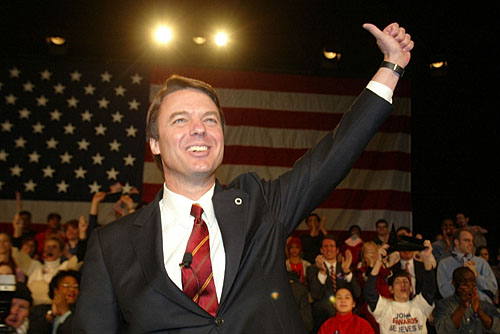EIDELSON AND THE UNNECESSARY EXEGESIS
That's what Alek and I recently decided my band would be called, given my penchant for, well, unnecessary exegesis (take these seven paragraphs analyzing one from Barack Obama). If that didn't satiate you, here's some more: Last month, I argued that there was only room in media discourse for one "Un-Hillary," and that the lack of consensus about Hillary Clinton's political profile creates the potential for that "Un-Hillary" to emerge from the left or from the right. Over at TNR, Ryan Lizza suggests, I think rightly, that John Edwards' star as a candidate for the Un-Hillary mantle is rising at the moment. There's plenty to agree with in his analysis. And then his piece ends with a peculiar turn of phrase:
A southern, moderate, antiwar, pro-labor candidate with low negatives and high positives who has already run for president is not a bad combination.Why "moderate"? Now, opposing our invasion of Iraq and the President's plan to "stay the course" there is a majority position in this country, as is support for the right to organize a union free of intimidation and the negotiation of trade deals that don't accelerate the race to the bottom. These are both areas where, at least for now, a majority of Americans are on the left. As Paul Waldman argues, there are more of them than one would think from listening to talking heads. And as David Sirota argued in a series of pieces after the 2004 election, "centrism" in the dominant media discourse has been warped to describe a set of policies with much greater support among the elite than the electorate. That said, the fact that most people in this country take a progressive position doesn't in and of itself make that position moderate, at least in the short term. Sure, in the long term social change depends on pulling the center towards your end, as the right has done much better than the left over the past few decades. And the most effective political leaders we have are the ones who can communicate progressive positions in ways which resonate with fundamental shared values even amongst people who don't see themselves as on the left. But I still think it's worth questioning what, especially in the pages of the New Republic, qualifies Edwards as a representative of moderation - other than the fact that he's popular, and if you believe moderation to be popular with the American people, you're inclined to look at someone as popular as him to be moderate as well (remember the DLC essay right when it looked like Kerry was going to beat Bush that celebrated how Trumanesque he was?) Otherwise, what is it that makes Edwards moderate in Lizza's eyes? His voting record when he last held office (by which standard the likes of Howard Dean and Ned Lamont - neither likely to win any popularity awards from TNR - are at least as moderate)? His support for the death penalty? His equivocation on civil unions? Or is it just the fact that he's from the South, and liberalism in some pundit's minds is a cultural affectation and not an ideological vision, and thus not something a southerner could or would want to take part in? Look, Edwards is no uber-leftist by any means, and there are certainly issues on which he could be more progressive and deserves criticism for not being. But it's hard to escape the sense that he wins the moderate label here and elsewhere because he comes off as likable and electable, and it's assumed that any likable electable politician must be a moderate.




1 Comments:
well, exhege- oh, my.
(dorkiest ancient greek joke ever. exegesis comes from exhegeomai - i lead out/explain.)
Post a Comment
<< Home